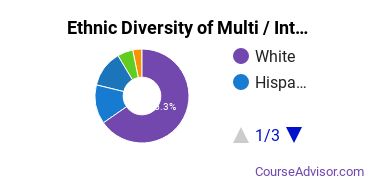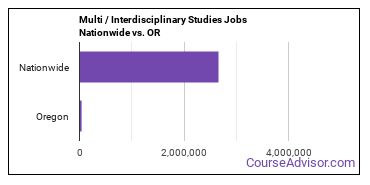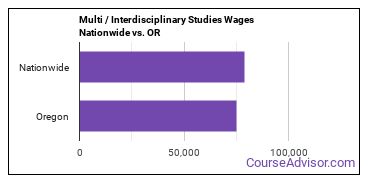Multi / Interdisciplinary Studies Schools in Oregon
In 2022-2023, 1,128 students earned their Multi / Interdisciplinary Studies degrees in OR.
As a degree choice, Multi / Interdisciplinary Studies is the 12th most popular major in the state.
Education Levels of Multi / Interdisciplinary Studies Majors in Oregon
Multi / Interdisciplinary Studies majors in the state tend to have the following degree levels:
| Education Level | Number of Grads |
|---|---|
| Bachelor’s Degree | 955 |
| Master’s Degree | 71 |
| Award Taking Less Than 1 Year | 40 |
| Post-Master’s Certificate | 36 |
| Postbaccalaureate Certificate | 36 |
| Doctor’s Degree (Research / Scholarship) | 11 |
| Doctor’s Degree (Professional Practice) | 11 |
| Doctor’s Degree (Other) | 11 |
| Award Taking 1 to 2 Years | 10 |
| Award Taking 2 to 4 Years | 10 |
| Associate Degree | 5 |
Gender Distribution
In Oregon, a multi / interdisciplinary studies major is more popular with women than with men.

Racial Distribution
The racial distribution of multi / interdisciplinary studies majors in Oregon is as follows:
- Asian: 6.1%
- Black or African American: 2.2%
- Hispanic or Latino: 13.7%
- White: 62.9%
- Non-Resident Alien: 3.5%
- Other Races: 11.5%

Jobs for Multi / Interdisciplinary Studies Grads in Oregon
29,890 people in the state and 2,654,640 in the nation are employed in jobs related to multi / interdisciplinary studies.

Wages for Multi / Interdisciplinary Studies Jobs in Oregon
Multi / Interdisciplinary Studies grads earn an average of $74,920 in the state and $78,820 nationwide.

Most Popular Multi / Interdisciplinary Studies Programs in OR
There are 10 colleges in Oregon that offer multi / interdisciplinary studies degrees. Learn about the most popular 10 below:
Seeking financial aid? At this school, 89% of students receive it. The full-time teacher rate is 52%. The student to faculty ratio is 17 to 1.
Request InformationOf all the teachers who work at the school, 70% are considered full time. It takes the average student 4.29 years to graduate. Students enjoy a student to faculty ratio of 20 to 1.
Request Information75% of the teachers are full time. This public school has an average net price of $19,577. The average student takes 4.51 years to complete their degree at Western Oregon State College.
Request Information19 to 1 is the student to faculty ratio. It takes the average student 4.58 years to graduate. 73% of the teachers are full time.
Request Information100% of students get financical aid. Students enjoy a student to faculty ratio of 13 to 1. Of all the teachers who work at the school, 59% are considered full time.
Request Information32% of the teachers are full time. 99% of students get financical aid. This private school has an average net price of $27,773.
Request InformationThis public college charges it's students an average net price of $16,577. The student to faculty ratio is 23 to 1. It takes the average student 4.54 years to graduate.
Request InformationAn average student at Reed will pay a net price of $32,966. The average student takes 4.21 years to complete their degree at Reed. 9 to 1 is the student to faculty ratio.
Request Information100% of students get financical aid. 69% of the teachers are full time. 9 to 1 is the student to faculty ratio.
Request InformationIt takes the average student 4.19 years to graduate. Students who attend this private institution pay an average net price of $24,835. 99% of students get financical aid.
Request InformationMulti / Interdisciplinary Studies Careers in OR
Some of the careers multi / interdisciplinary studies majors go into include:
| Job Title | OR Job Growth | OR Median Salary |
|---|---|---|
| Computer Workers | 15% | $77,540 |
| Archivists | 14% | $39,750 |
| Dietetic Technicians | 13% | $45,060 |
| Anthropologists and Archeologists | 4% | $59,510 |
Explore Major by State
Alabama
Arkansas
Connecticut
Florida
Idaho
Iowa
Louisiana
Massachusetts
Mississippi
Nebraska
New Jersey
North Carolina
Oklahoma
Rhode Island
Tennessee
Vermont
West Virginia
View Nationwide Multi / Interdisciplinary Studies Report
References
More about our data sources and methodologies.









